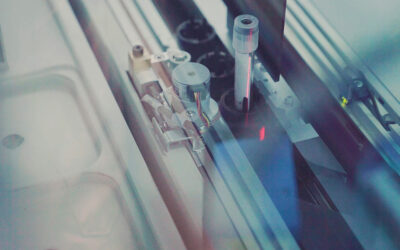You may have heard the longstanding adage from a baby-boomer-generation chemistry colleague — like the author of this article — that back in the good old days we had to spend quality time in the library, read the literature, really think deeply, be creative, savor and enjoy the fruits of our ideas and research.
It all happened at such a leisurely and enjoyable pace; everything was done in a serial fashion, from designing and implementing a synthesis to analyzing the product, computational modeling with ten-characters-per-second data input and output on a punched tape, imagining utility of your pet chemical discovery, the excitement and joy of each step motivating the next big thing.
Communication was slow and publication relaxed. Papers were often written by hand and transcribed into Olivetti type. Figures were drawn on parchment paper, and few journals were available to send manuscripts to, possibly arriving safely by the luck of snail mail.
There was always the thrill of being the first to invent, competition was healthy, inspiring, and encouraging. Discourse with colleagues in near or distant countries was not easy but the challenges of travel and excitement of getting together at conferences made it all worthwhile.
Now, everything in chemistry seems to be turbocharged and accelerated, but what has changed?
We all know the answer: technology, the internet, and global competition literally at the speed of light. The mantras are faster-and-faster, first-to-the-post, bigger-and-bigger groups, impact factors, and h-envy. Pre-print websites allow chemists to post papers first, to finesse a new way of showing they were not pipped to the post — without even going through peer review!
How does the chemistry community really feel about that?
I know first-hand from colleagues in their early, mid- and late careers that they too feel the pain of the literature moving so quickly. It’s so difficult to know if you have a full up-to-date grasp of the field, the disquieting feeling of not knowing what you are missing and having to live with that uncertainty.
Do we need to decelerate?
Are we becoming overwhelmed with the number of new journals, mushrooming information, impossible-to-consume in a meaningful way, so we cherry pick?
Do we really want AI and algorithmically programmed robots to replace us humans doing what we have enjoyed the most as chemists since the birth of alchemy? Everything is an algorithm, a black box of mystery and uncertainty, but where have all the equations gone? I have explored this question recently, in an earlier article.
Is this the most creative and satisfying way to do chemistry? Are we spending enough quality time dreaming up ideas, reading the literature, thinking about and double-checking research results, or are we spreading our time too thinly?
In a global public health emergency like a pandemic, speed is of the essence, that cannot be denied. Similarly, but at a slower-moving pace, the looming climate catastrophe and the consequences of plastic pollution demand speedy solutions.
But then again, in curiosity-inspired chemistry, which has delivered some of the greatest advances and benefits to humankind, do we really need to turbocharge our approach to make discoveries as important as those in the past, which were made at a much slower pace?
What is the fun in that? Maybe these are just the ramblings of a baby-boomer chemist, but perhaps today’s millennials, Gen Z, and Gen Alpha chemists feel the same way about conducting their work at this new breakneck speed!
Do they believe in better living through turbo-chemistry? Maybe if they continue to accelerate, they will find more time to think and play?
Feature image credit: Christa Dodoo on Unsplash

















